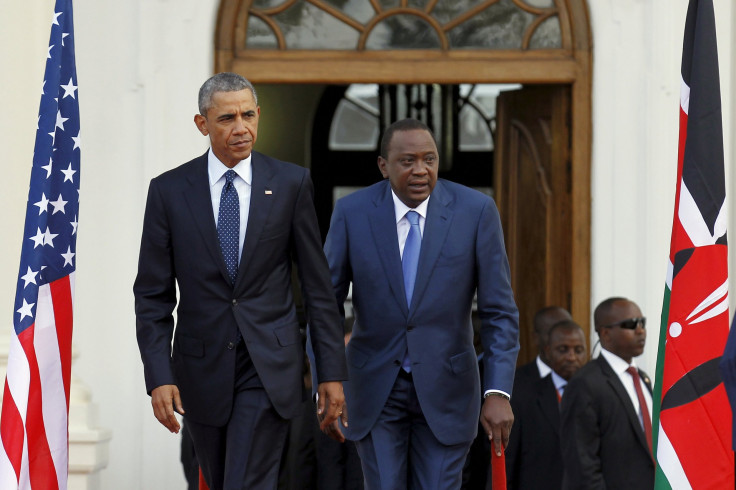Obama In Kenya: Joint Press Conference With Kenyan President Uhuru Kenyatta Highlights Shared Values But Disparate Views On Gay Rights

U.S. President Barack Obama’s first official visit to his father’s home country of Kenya was mostly a friendly diplomatic affair, including a dinner with extended family and a pledge to launch a new direct flight connecting citizens in both nations. But Obama’s disagreement with Kenya’s President Uhuru Kenyatta on the issue of gay rights came to the forefront at a joint press conference at the Statehouse in Nairobi Saturday.
The presidential discussion highlighted the delicate challenge the U.S. faces in maintaining strong relations with foreign states that impose imprisonment and other harsh punishments on gay citizens, which the American government has called an abuse of human rights.
Obama said before the press conference that a frank discussion of Kenya’s discriminatory policies on gay rights would be on the agenda when he met with Kenyatta. In Kenya, sodomy is a crime punishable by as long as 14 years in prison, according to the Associated Press.
Obama on gay rights in Kenya: As African American in the US I am painfully aware of what happens when ppl treated differently under the law
— Carol Lee (@carol_e_lee) July 25, 2015The Obama administration has attempted to address this issue in other African countries with similar restrictions. Last year, Obama pressed Uganda’s leaders to act against an Anti-Homosexuality Act that would impose a life sentence on citizens for “aggravated homosexuality.” The bill passed, and the U.S. pulled financial aid for government-led police and health services from the country, as Politico reported. Before and during the press conference, however, Kenyatta brushed aside Obama’s concerns about the prosecution of gay Kenyans, calling it a “nonissue.”
@UKenyatta "Kenya and the US share so many values but not on #Homosexuality. Gay rights are a non-issue" @dailynation #ObamaInKenya
— Eunice Kilonzo (@Eunicekkilonzo) July 25, 2015Kenyan president on Gay rights: US/Kenya share so many values... "There are some things that we must admit we don't share."
— Edith Honan (@edithhonan) July 25, 2015Expanding Access To Electricity
Outside the area of gay rights, Obama and Kenyatta echoed one another’s commitment to several shared policies and nation-building initiatives throughout the visit. Both leaders expressed a desire to strengthen the already-friendly relations between their countries. Kenyatta said Kenya is committed to “deepening partnerships that already existed” between the U.S. and other countries, both east and west, in the name of progress.
During the press conference, Obama announced a proposed ban on the transport of ivory across U.S. state lines in a move to protect African elephants from poachers.
When asked by a reporter about his legacy in Africa, Obama replied by highlighting his effort to bring electricity to rural Africa through a $7 billion project called Power Africa, which was recently criticized in the New York Times for having yet to deliver a single megawatt of electricity.
“If we can get sub-Saharan Africa to be electrified at the same level Asia is -- that alone is going to drive economic productivity exponentially,” Obama said. “It’s a game-changer.”
The heads of state also unveiled plans for a direct flight between Kenya and the U.S., which both said would be an important step in drawing the nations closer together. However, they did not announce an official date for the air service to launch. “I anticipate that, if we can get all the issues squared away, that this is something that has great potential and obviously would have a beneficial impact on U.S. travel to Kenya, both for business and for tourism,” Obama said.
A Family Affair
Obama, who met with members of his extended family in Kenya over dinner Friday night, said he wishes to become more involved in Kenya through philanthropic work after completing his term as president. “I’m more restricted, ironically, as president of the United States than I will be as a private citizen in terms of some of the hands-on direct help I’d like to give,” he said.
When asked to expand on those plans, Obama replied by declining to offer more details except to say that first lady Michele Obama and their daughters, Sasha and Malia, would likely accompany him on future trips.
“Here’s what I can guarantee -- I’ll be back,” he said.
© Copyright IBTimes 2025. All rights reserved.






















